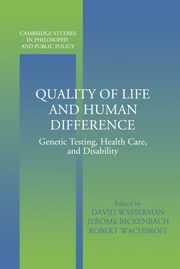Book contents
- Frontmatter
- Contents
- Contributors
- Acknowledgments
- Introduction
- 1 Assessing Quality of Life: Clinical versus Health Policy Uses
- 2 Predicting Genetic Disability while Commodifying Health
- 3 Preventing Genetically Transmitted Disabilities while Respecting Persons with Disabilities
- 4 Disability, Ideology, and Quality of Life: A Bias in Biomedical Ethics
- 5 Values for Health States in QALYs and DALYs: Desirability versus Well-Being and Worth
- 6 Preventing the Existence of People with Disabilities
- 7 Where Is the Sin in Synecdoche? Prenatal Testing and the Parent-Child Relationship
- 8 The Social Context of Individual Choice
- 9 Disability and Health Systems Assessment
- Index
3 - Preventing Genetically Transmitted Disabilities while Respecting Persons with Disabilities
Published online by Cambridge University Press: 03 December 2009
- Frontmatter
- Contents
- Contributors
- Acknowledgments
- Introduction
- 1 Assessing Quality of Life: Clinical versus Health Policy Uses
- 2 Predicting Genetic Disability while Commodifying Health
- 3 Preventing Genetically Transmitted Disabilities while Respecting Persons with Disabilities
- 4 Disability, Ideology, and Quality of Life: A Bias in Biomedical Ethics
- 5 Values for Health States in QALYs and DALYs: Desirability versus Well-Being and Worth
- 6 Preventing the Existence of People with Disabilities
- 7 Where Is the Sin in Synecdoche? Prenatal Testing and the Parent-Child Relationship
- 8 The Social Context of Individual Choice
- 9 Disability and Health Systems Assessment
- Index
Summary
The principal goal of the Human Genome Project and other genetic research is to increase our capacity to prevent or treat human disease. We now devote substantial resources to research furthering the understanding of the genetic basis of various serious disabling congenital conditions. When genes are identified for such conditions, tests can usually be developed that will enable prospective parents to determine their risk of passing on the conditions to their children, or that will determine the presence of the condition in a fetus. Health insurance often supports the costs of this testing. In the future, such testing of a fetus may allow genetic or other in utero interventions to prevent the development of the disabling condition, but there is typically a considerable time lag between the development of genetic tests for a congenital condition and therapeutic interventions to prevent or treat the condition. When individuals pursue such testing now, either before or after conception, they typically do so with the intent of avoiding the birth of a child with the condition that is being tested for. This can be done before conception by employing sperm and/or egg donation in order to eliminate the genetic material of the person carrying the genes for the condition; by using in vitro fertilization and preimplantation embryo testing; or by avoiding conception altogether. It can be done after conception by aborting an affected fetus and trying again to achieve a normal pregnancy.
- Type
- Chapter
- Information
- Quality of Life and Human DifferenceGenetic Testing, Health Care, and Disability, pp. 67 - 100Publisher: Cambridge University PressPrint publication year: 2005
- 24
- Cited by



